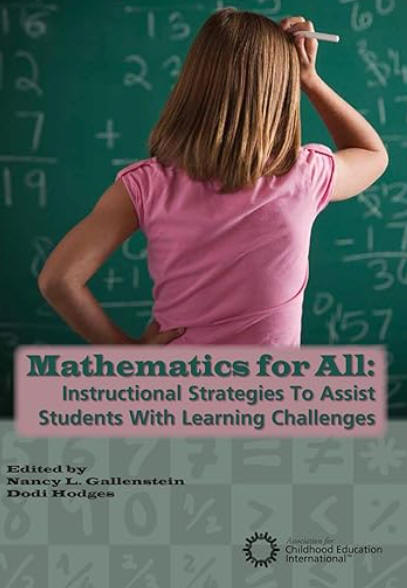Math Topics
Learning Support
Professional
![]()

This page provides education associations related to:
![]()
American Mathematical Society is devoted to mathematics research and scholarship, strengthening mathematical education, and fostering awareness and appreciation of mathematics and its connections to other disciplines and to everyday life.
Association for Women in Mathematics encourages "women and girls to study and to have active careers in the mathematical sciences, and to promote equal opportunity and the equal treatment of women and girls in the mathematical sciences" (About section).
Association of Mathematics Teacher Educators (AMTE) is devoted to improving mathematics teacher education for K-12 from pre-service through professional development of those already in the field. For example, in 2017 AMTE and its writing team released its official publication of Standards for Preparing Teachers of Mathematics. In 2019 supplementary materials were released to support implementation of those standards.
Canadian Mathematical Society--Education section with resources for teachers and students.
Conference Board of the Mathematical Sciences "an umbrella organization consisting of sixteen professional societies all of which have as one of their primary objectives the increase or diffusion of knowledge in one or more of the mathematical sciences. Its purpose is to promote understanding and cooperation among these national organizations so that they work together and support each other in their efforts to promote research, improve education, and expand the uses of mathematics" (About CBMS section).
Of particular relevance for math educators is its work in the area of The Mathematical Education of Teachers. This 2012 document, available online, was prompted by the Common Core State Standards for Mathematics. It updates the first MET of 2001 with "recommendations for the mathematical preparation of teachers of elementary grades, middle grades, and high school." It has "recommendations for the professional development of teachers of mathematics" and discusses "the mathematical needs of elementary mathematics specialists, and of teachers in early childhood education and special education" (Preface section).
Mathematical Association of America
National Council of Teachers of Mathematics has provided leadership for the development of national math standards. The site offers access to lessons and resources, grants, conferences, professional development, journals and books, research, and more.
National Council of Supervisors of Mathematics is for anyone interested in leadership in math education. Of particular value are articles from past issues of the Journal of Mathematics Education Leadership, available to members of the NCSM, and professional development opportunities. Also see Common Core State Standards Mathematics Curriculum Materials Analysis Tools to assist with selection of materials aligned to the math standards.
Ohio Council of Teachers of Mathematics OCTM also offers abstracts from the Ohio Journal of School Mathematics and sponsors the State Mathematics Tournament, an annual mathematics competition open to students of grades 9-12.
Ontario Association for Mathematics Education (Canada)
School Science and Mathematics Association (SSMA) "focuses on promoting research-based innovations related to K-16 teacher preparation and continued professional enhancement in science and mathematics. Target audiences include higher education faculty members, K-16 school leaders and K-16 classroom teachers" (Welcome to SSMA section).
Association for Educational Communications and Technology (AECT) is a professional association of thousands of educators and others whose activities are directed towards improving instruction through technology.
Association for the Advancement of Computing in Education (AACE), founded in 1981, is an international, not-for-profit, educational organization with the mission of advancing Information Technology in Education and E-Learning research, development, learning, and its practical application. AACE has a number of journals and a digital library. AACE also sponsors annual conferences: EdMedia + Innovate Learning, and SITE (Society for Information Technology and Teacher Education).
CAST (Center for Applied Special Technology) promotes and includes resources for universal design for learning. CAST includes the National Center on Accessible Educational Materials for Learning, the Center on Inclusive Software for Learning, and the Center on Inclusive Technology & Education Systems.
Center for Children and Technology from the Education Development Center investigates the roles that technology can play in improving teaching and learning within children's classrooms, schools and communities. CCT conducts basic, applied, formative, and summative research, often in school settings, using quantitative and qualitative research methods. CCT also designs and develops technology applications that support engaged, active learning and student-centered teaching practices. See its publications online.
Computer Using Educators is a California based organization for K-12 and postsecondary educators whose mission is to advance student achievement through technology. CUE publishes a journal OnCue four times a year for its members; however, selected resources are available online.
Educause is a nonprofit association whose mission is to advance higher education by promoting the intelligent use of information technology. Primary publications include Educause Quarterly and Educause Review. Several articles and podcasts are available online.
International Society for Technology in Education (ISTE)
Society for Information Technology and Teacher Education (SITE) "promotes the development and dissemination of theoretical knowledge, conceptual research, and professional practice knowledge through the SITE conference, books, collaborative projects with other organizations, and the Journal of Technology and Teacher Education" (About section).
State Educational Technology Directors Association (SETDA) "is the principal association representing U.S. state and territorial educational technology and digital learning leaders." It promotes "leveraging technology for learning, teaching, and school operations" (About Us section). You'll find multiple topic areas.
American Educational Research Association
American Institutes for Research: Education
Mid-Western Educational Research Association
Northeastern Educational Research Association
SRI International: Education and Learning
Washington Educational Research Association
Alliance for Excellent Education has a mission to "to promote high school transformation to make it possible for every child to graduate prepared for postsecondary learning and success in life" (About section). You'll find resources on multiple issues, publications, webinars and events, and state and national data (e.g., reading proficiency, high school graduation rates, college readiness rates, 4-year college graduation rates, employability).
American Association of School Administrators (AASA) presents issues and insights on assessment/standards, instruction, leadership, No Child Left Behind, parent/public involvement, safe schools, technology, professional development, school/district governance, grants/funding and much more.
American Federation of Teachers (AFT)
ASCD provides books and publications, the magazine Educational Leadership, professional development, and information on a variety of topics of value to educators.
Association for Middle Level Education (AMLE), formerly National Middle School Association, "supports those who work with kids in grades 5–9, regardless of the grade configurations of the schools that house them" (About AMLE section). AMLE publishes the Middle School Journal.
The Association of American Educators (AAE) "is the largest national, non-union, professional educators' organization, advancing the profession by offering a modern approach to teacher representation and educational advocacy, as well as promoting professionalism, collaboration and excellence without a partisan agenda" (Who Are We section).
Aurora Institute (formerly iNACOL) focuses on competency-based, personalized learning. Note: Effective October 28, 2019, iNACOL changed its name to the Aurora Institute to reflect its shift in focus from educational technology to competency-based, personalized learning.
Canadian Education Association
 Childhood Education
International Among publications of interest is the book:
Mathematics for All: Instructional Strategies To Assist Students With Learning Challenges, Editors: Nancy L. Gallenstein
and Dodi Hodges, 2011.
Childhood Education
International Among publications of interest is the book:
Mathematics for All: Instructional Strategies To Assist Students With Learning Challenges, Editors: Nancy L. Gallenstein
and Dodi Hodges, 2011.
Council for Accreditation of Educator Preparation: CAEP is the profession’s mechanism to help establish high quality teacher preparation.
Learning Forward is designed for the professional learning for educators.
National Association for the Education of Young Children
National Association for Gifted Children
National Association of State Boards of Education
National Board for Professional Teaching Standards--become a National Board Certified Teacher.
National Center for the Improvement of Educational Assessment, Inc. contributes "to improved student achievement through enhanced policies and practices in educational assessment and accountability." The Center works "with states and other educational agencies to design and implement effective assessment and accountability policies and programs" (About Us section). Publications are available online, including those related to Common Core standards.
National Center on Educational Outcomes provides "national leadership in designing and building educational assessments and accountability systems that appropriately monitor educational results for all students, including students with disabilities and English Language Learners" (About NCEO section).
National Education Association has resources on a number of issues, including a commentary for parents to better understand the Common Core Standards, located at Common Core 101.
National Test Prep Association
The U.S. Department of Education
State Level Education Associations |
|||
International Council for Open and Distance Education "works towards bringing accessible, quality education to all through online, open, and distance learning." The Council also includes a list of journals relating to online, open, and distance learning.
International E-Learning Association is "dedicated to advancing the knowledge and practice of e-learning in the classroom and the workplace" (Home page description). Of particular value to educators are its International Journal of Interactive Mobile Technologies and International Journal of Emerging Technologies in E-Learning.
Online Learning Consortium is "dedicated to advancing quality digital teaching and learning experiences designed to reach and engage the modern learner – anyone, anywhere, anytime." Among resources is its peer-reviewed, quarterly journal: Online Learning.
Quality Matters "is the global organization leading quality assurance in online and innovative digital teaching and learning environments" (About section). Resources include rubrics and standards for higher ed, K-12, and continuing education and professional development "to guide you through the development, evaluation, and improvement of your online and blended courses." There's a research library, professional development opportunities, and more.
The Learning Guild features numerous resources of value to educators in its curated content.
United States Distance Learning Association The association's purpose is to promote the development and application of distance learning for education and training. The constituents served include Pre-K through grade 12 education, higher education, home school education, continuing education, corporate training, military and government training, and telemedicine.